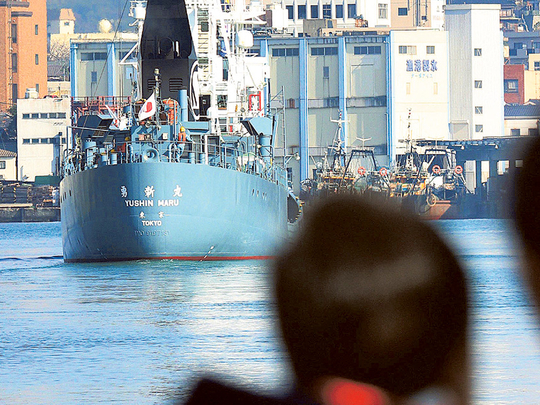
Sydney: Japan’s whaling fleet set out for the Antarctic on Tuesday to resume a hunt for the mammals after a year-long hiatus, prompting international criticism.
Japan aims to take more than 300 whales before the hunt ends next year and nearly 4,000 over the next 12 years as part of a scientific programme to research the whales.
The move faced mounting condemnation Tuesday, with conservationists saying it was open to another legal challenge.
Australia and New Zealand have led criticism of the resumption of “scientific” whaling, with both expressing disappointment.
“It’s not scientific research, it’s straight up commercial whaling, and it’s been declared illegal by the International Court of Justice,” said Nathaniel Pelle from Greenpeace Australia.
The International Court of Justice (ICJ) ruled last year that Japan’s whaling in the Southern Ocean should stop and an International Whaling Commission (IWC) panel said in April that Japan had yet to demonstrate a need for killing whales.
But Tokyo retooled its plan for the 2015/16 season to cut the number of minke whales it intends to take to 333, down by two-thirds from previous hunts.
“Last year, regrettably, the ICJ made its ruling and we were unable to take whales,” said Tomoaki Nakao, the mayor of the western city of Shimonoseki that is home to the whaling fleet and part of Prime Minister Shinzo Abe’s election district.
“There’s nothing as happy as this day,” he told the fleet’s crew at a ceremony before their departure.
Shortly before noon the ships sailed away under a clear blue sky, with family members and officials waving from the shore.
The hunt is expected to last until March.
Japan, which has long maintained that most whale species are not endangered and that eating whale is part of its food culture, began what it calls “scientific whaling” in 1987, a year after an international whaling moratorium took effect.
The meat ends up on store shelves, although most Japanese no longer eat it.
Officials, including Abe, have long said their ultimate goal is the resumption of commercial whaling — a pledge Abe repeated in a message read at the pre-departure ceremony.
But the International Fund for Animal Welfare and the Australian Marine Conservation Society said a panel of legal experts asked to consider Japan’s proposed new “scientific” whaling had found it broke international law.
The Australian and New Zealand experts said the new mission was inconsistent with Japan’s international obligations.
“The panel concluded that Japan’s new whaling program violates international law and that Australia or other countries still have options to challenge Japan’s actions before international courts,” said chair and Australian National University professor Donald Rothwell.
Australia has urged a diplomatic solution, with Attorney-General George Brandis saying Monday the government would be taking the matter “to the highest level”.
“Australia is urging Japan ... not to resume this practice,” Brandis told the Senate, adding that sending a boat to monitor the Southern Ocean was a possibility.
New Zealand’s acting Foreign Minister Todd McClay said the resumption of whaling was deeply disappointing.
“New Zealand’s long-standing and fundamental opposition to this practice remains unchanged,” he said at the weekend.
“It is clear that Japan’s research objectives can be met using non-lethal means,” he said, adding New Zealand was considering “all options”.
Environmentalists from Sea Shepherd Australia have said they will pursue the Japanese fleet and aim to intervene in any slaughter of the animals.
Australia and key Japanese ally the United States both opposed the hunt.
“We believe that all of Japan’s primary research objectives can be met through non-lethal activities and continue to oppose their scientific whaling programmes,” said Russell F. Smith, the US commissioner to the IWC.












